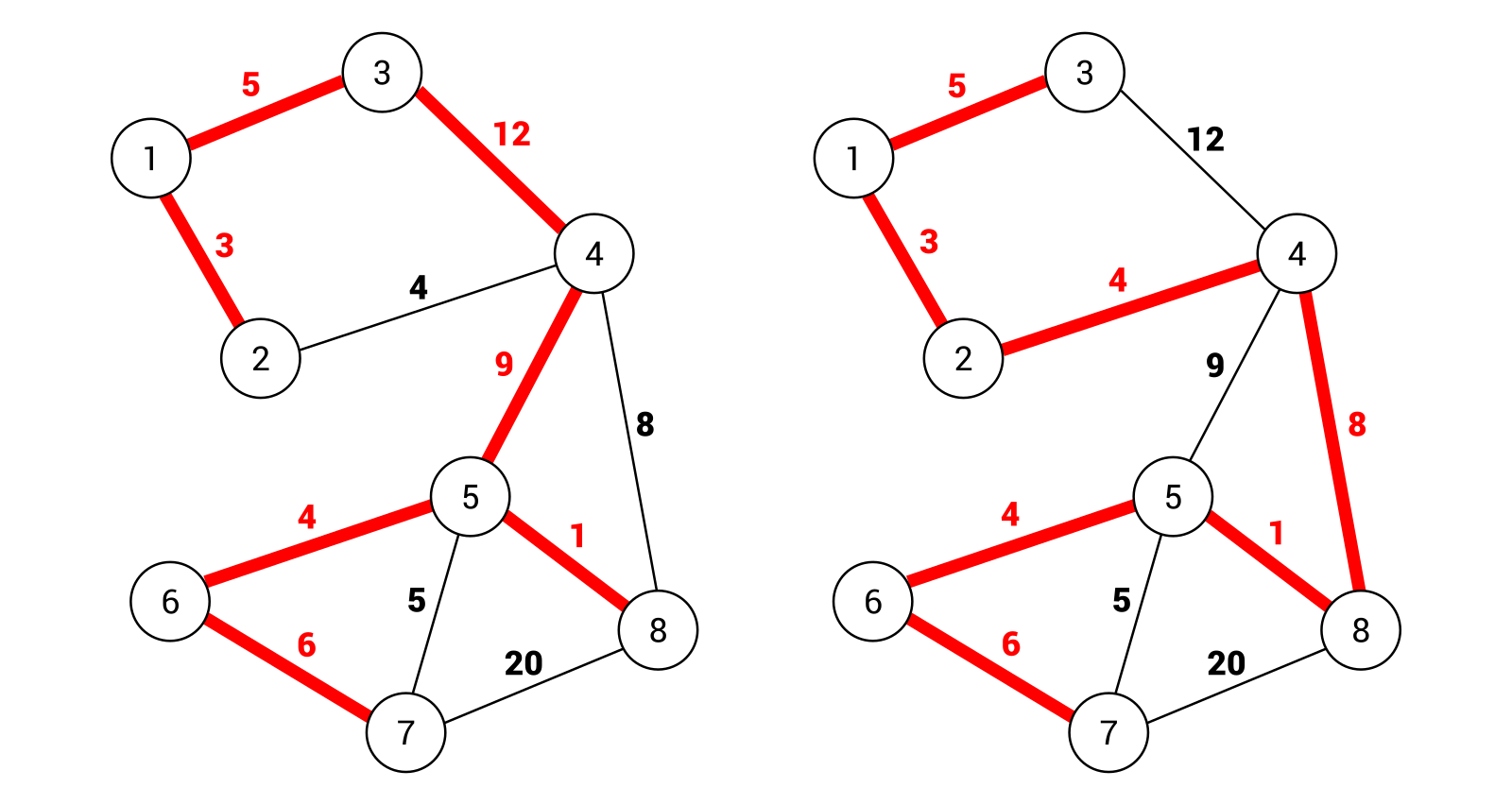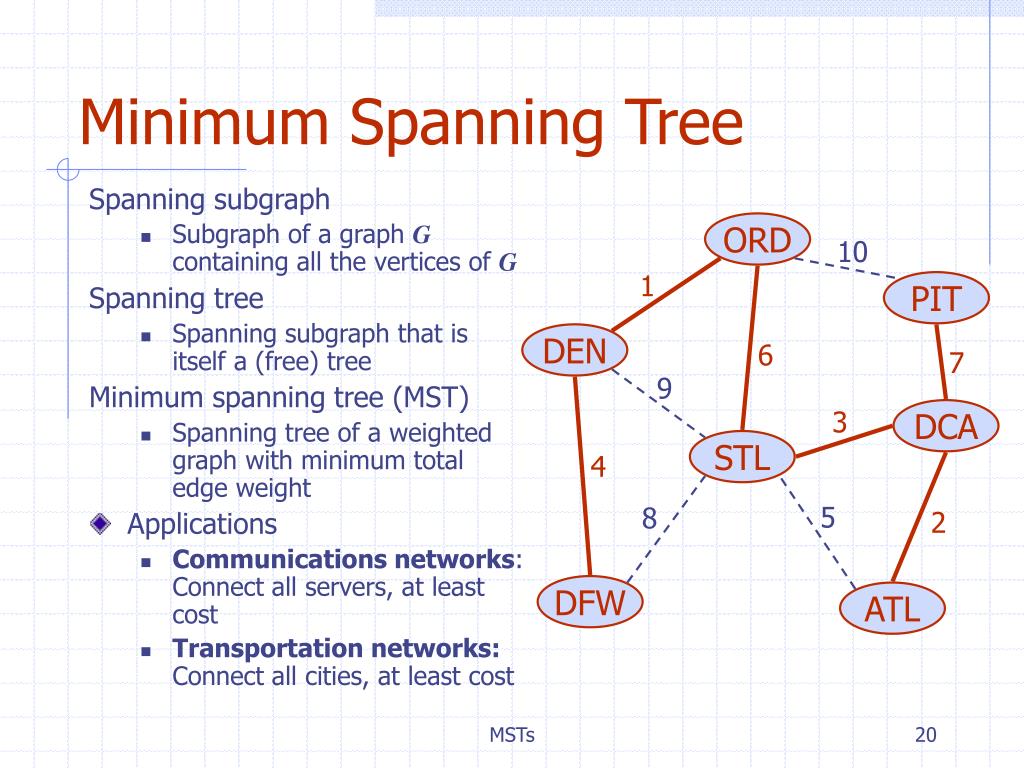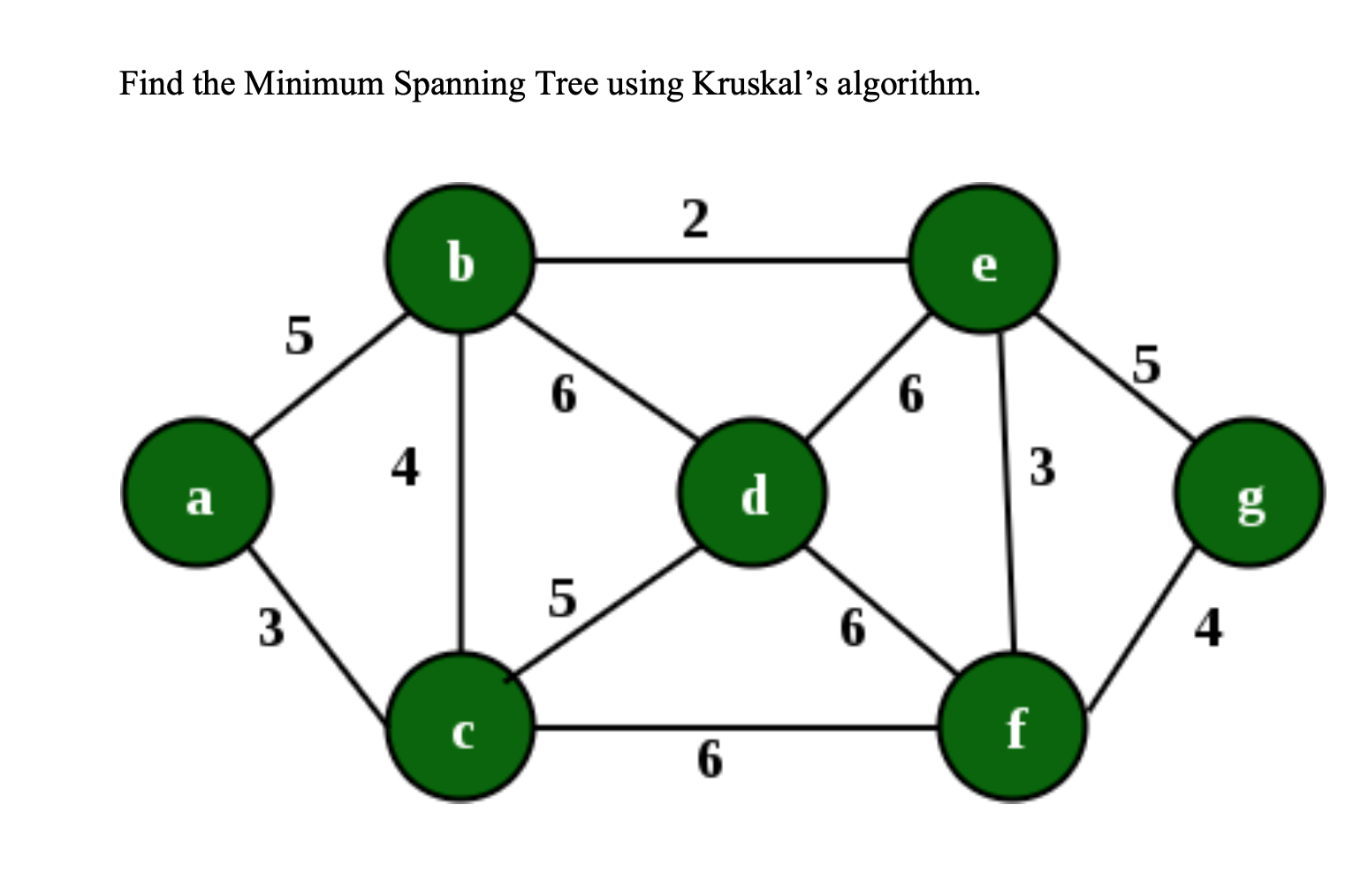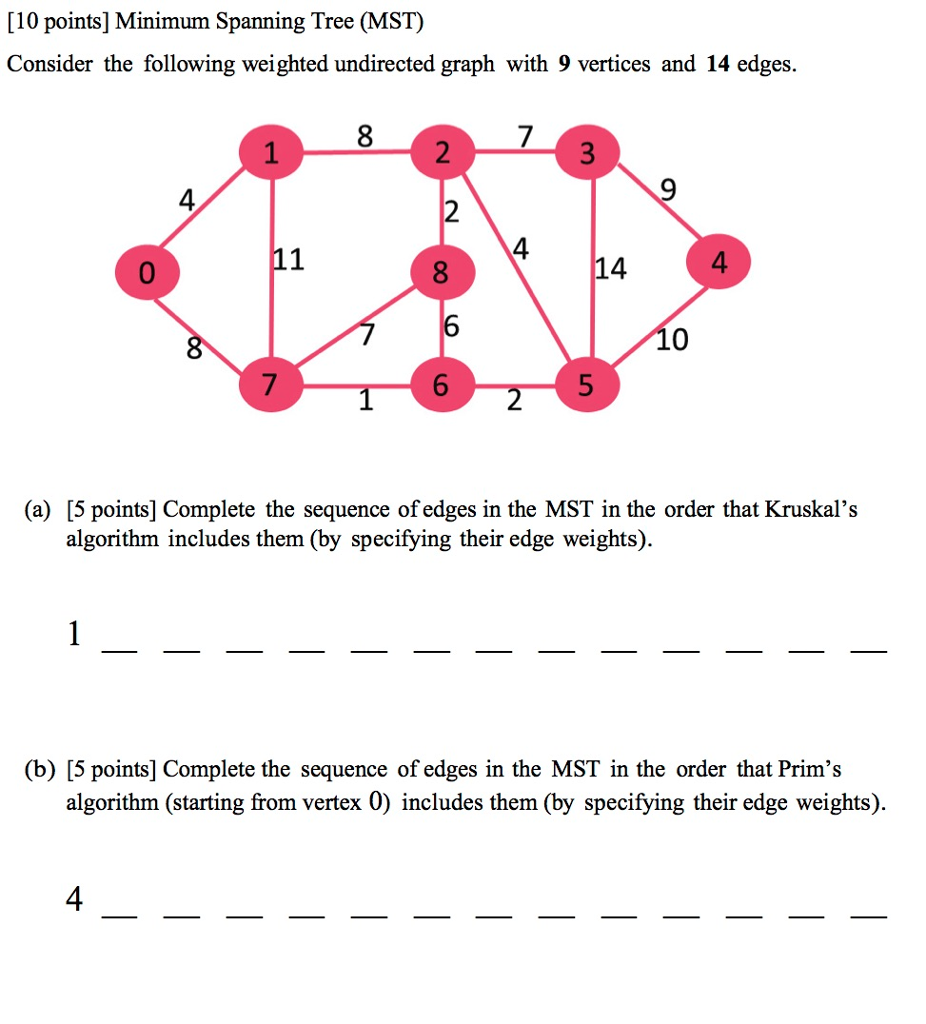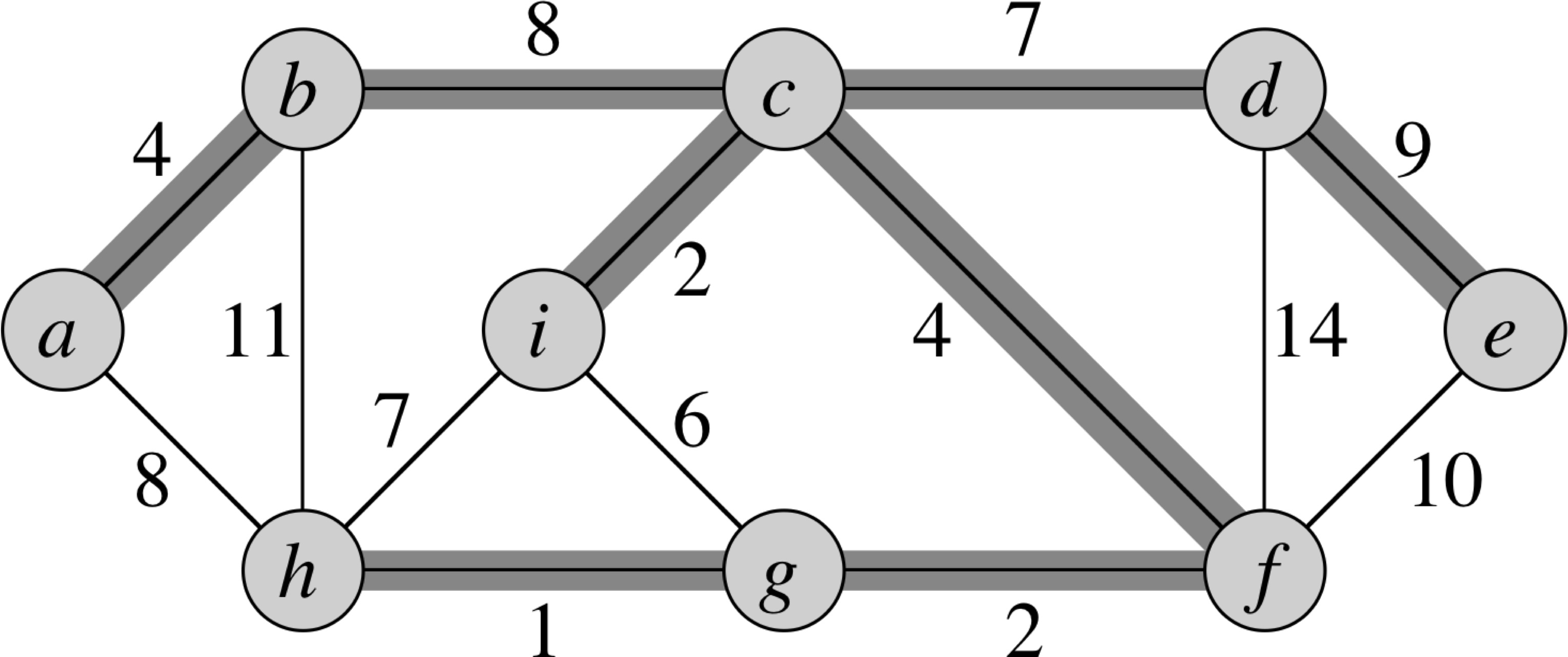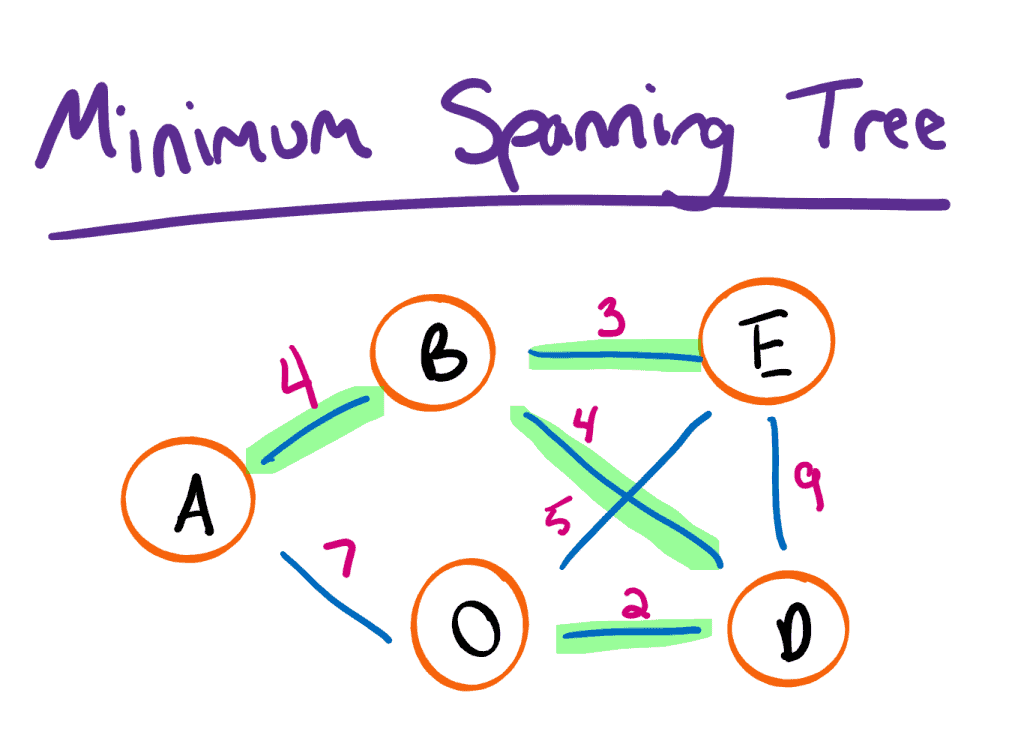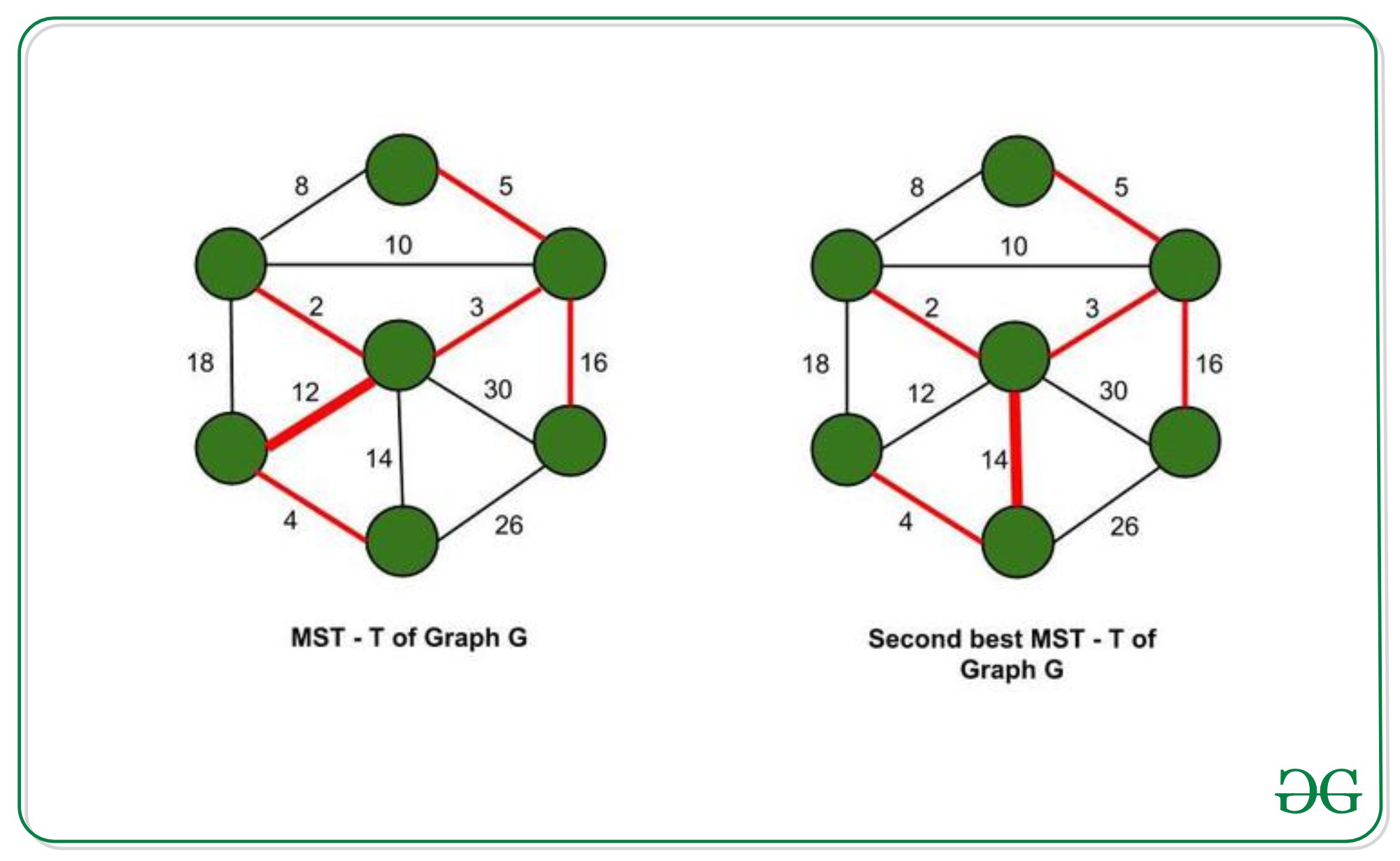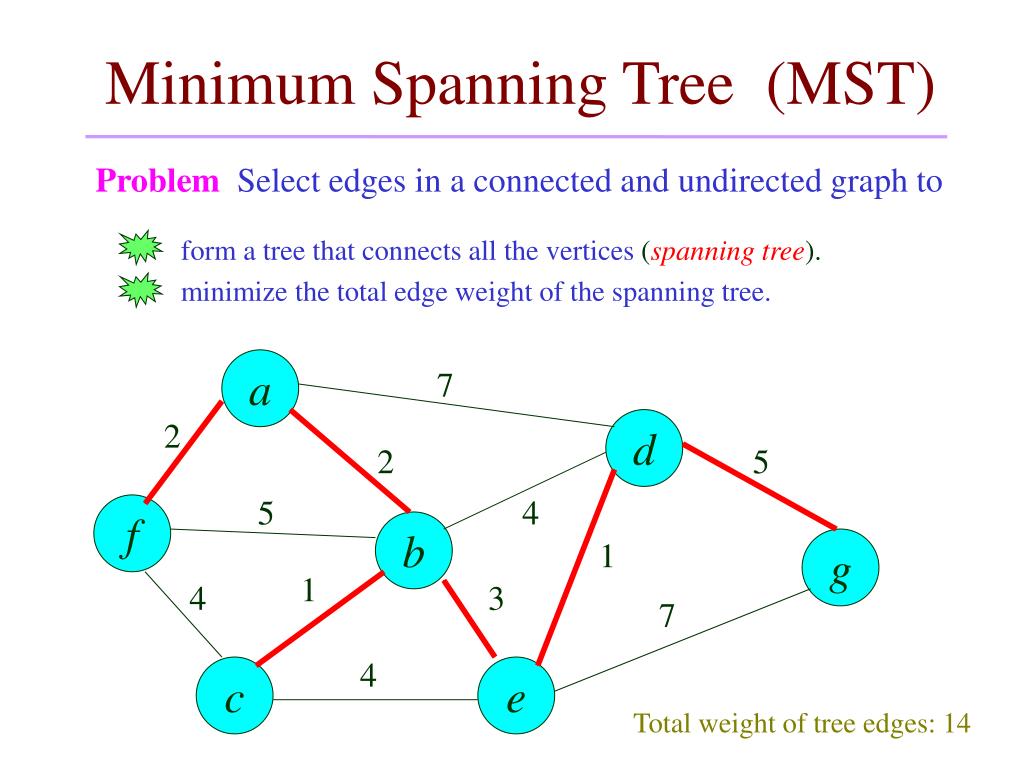Minimum Spanning Tree - It should be a spanning tree, since if a network isn’t a tree you can always remove some edges and save money. The fastest minimum spanning tree algorithm to date was developed by david karger, philip klein, and robert tarjan, who found a linear time randomized algorithm based on a combination of. Return the resulting tree t'. As far as i can tell, removal requires o(n^2), because for each edge (assume sorted already in a list), we need to find the smallest edge which connects the two spanning trees. Add {u, v} to the spanning tree. (proving that this works is tedious but doable.) this would give an algorithm of cost o(t(m, n) + kn), since you would be building. I think the best way of finding the number of minimum spanning tree must be something. There is only one minimum spanning tree in the graph where the weights of vertices are different.
Add {u, v} to the spanning tree. (proving that this works is tedious but doable.) this would give an algorithm of cost o(t(m, n) + kn), since you would be building. Return the resulting tree t'. I think the best way of finding the number of minimum spanning tree must be something. As far as i can tell, removal requires o(n^2), because for each edge (assume sorted already in a list), we need to find the smallest edge which connects the two spanning trees. It should be a spanning tree, since if a network isn’t a tree you can always remove some edges and save money. The fastest minimum spanning tree algorithm to date was developed by david karger, philip klein, and robert tarjan, who found a linear time randomized algorithm based on a combination of. There is only one minimum spanning tree in the graph where the weights of vertices are different.
(proving that this works is tedious but doable.) this would give an algorithm of cost o(t(m, n) + kn), since you would be building. Add {u, v} to the spanning tree. As far as i can tell, removal requires o(n^2), because for each edge (assume sorted already in a list), we need to find the smallest edge which connects the two spanning trees. Return the resulting tree t'. The fastest minimum spanning tree algorithm to date was developed by david karger, philip klein, and robert tarjan, who found a linear time randomized algorithm based on a combination of. I think the best way of finding the number of minimum spanning tree must be something. It should be a spanning tree, since if a network isn’t a tree you can always remove some edges and save money. There is only one minimum spanning tree in the graph where the weights of vertices are different.
Data Structure Minimum Spanning Tree
It should be a spanning tree, since if a network isn’t a tree you can always remove some edges and save money. (proving that this works is tedious but doable.) this would give an algorithm of cost o(t(m, n) + kn), since you would be building. Return the resulting tree t'. The fastest minimum spanning tree algorithm to date was.
Minimum spanning tree C Data Structures and Algorithms
(proving that this works is tedious but doable.) this would give an algorithm of cost o(t(m, n) + kn), since you would be building. Return the resulting tree t'. As far as i can tell, removal requires o(n^2), because for each edge (assume sorted already in a list), we need to find the smallest edge which connects the two spanning.
Minimum Spanning Tree Definition Examples Prim S Algorithm Riset
(proving that this works is tedious but doable.) this would give an algorithm of cost o(t(m, n) + kn), since you would be building. I think the best way of finding the number of minimum spanning tree must be something. Add {u, v} to the spanning tree. It should be a spanning tree, since if a network isn’t a tree.
Answered Find the Minimum Spanning Tree using… bartleby
It should be a spanning tree, since if a network isn’t a tree you can always remove some edges and save money. There is only one minimum spanning tree in the graph where the weights of vertices are different. Add {u, v} to the spanning tree. I think the best way of finding the number of minimum spanning tree must.
Solved Minimum Spanning Tree (MST) Consider the following
As far as i can tell, removal requires o(n^2), because for each edge (assume sorted already in a list), we need to find the smallest edge which connects the two spanning trees. There is only one minimum spanning tree in the graph where the weights of vertices are different. Return the resulting tree t'. It should be a spanning tree,.
Minimum Spanning Tree
Return the resulting tree t'. Add {u, v} to the spanning tree. The fastest minimum spanning tree algorithm to date was developed by david karger, philip klein, and robert tarjan, who found a linear time randomized algorithm based on a combination of. I think the best way of finding the number of minimum spanning tree must be something. As far.
Graphs Finding Minimum Spanning Trees with Kruskal's Algorithm a
There is only one minimum spanning tree in the graph where the weights of vertices are different. Return the resulting tree t'. It should be a spanning tree, since if a network isn’t a tree you can always remove some edges and save money. As far as i can tell, removal requires o(n^2), because for each edge (assume sorted already.
Minimum Spanning Tree Algorithms The Renegade Coder
Add {u, v} to the spanning tree. I think the best way of finding the number of minimum spanning tree must be something. (proving that this works is tedious but doable.) this would give an algorithm of cost o(t(m, n) + kn), since you would be building. As far as i can tell, removal requires o(n^2), because for each edge.
Second Best Minimum Spanning Tree
Add {u, v} to the spanning tree. There is only one minimum spanning tree in the graph where the weights of vertices are different. I think the best way of finding the number of minimum spanning tree must be something. Return the resulting tree t'. It should be a spanning tree, since if a network isn’t a tree you can.
PPT Minimum Spanning Tree (MST) PowerPoint Presentation, free
Return the resulting tree t'. The fastest minimum spanning tree algorithm to date was developed by david karger, philip klein, and robert tarjan, who found a linear time randomized algorithm based on a combination of. Add {u, v} to the spanning tree. There is only one minimum spanning tree in the graph where the weights of vertices are different. I.
There Is Only One Minimum Spanning Tree In The Graph Where The Weights Of Vertices Are Different.
Return the resulting tree t'. It should be a spanning tree, since if a network isn’t a tree you can always remove some edges and save money. Add {u, v} to the spanning tree. (proving that this works is tedious but doable.) this would give an algorithm of cost o(t(m, n) + kn), since you would be building.
I Think The Best Way Of Finding The Number Of Minimum Spanning Tree Must Be Something.
The fastest minimum spanning tree algorithm to date was developed by david karger, philip klein, and robert tarjan, who found a linear time randomized algorithm based on a combination of. As far as i can tell, removal requires o(n^2), because for each edge (assume sorted already in a list), we need to find the smallest edge which connects the two spanning trees.

